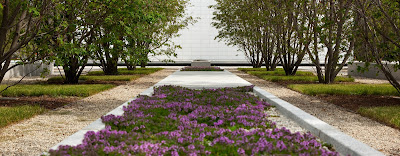The
Ismaili Centres are symbolic markers of the permanent presence and core
values of Ismaili communities around the world. Incorporating spaces
for social and cultural gatherings, intellectual engagement and
reflection, as well as spiritual contemplation, they are bridges of
friendship and understanding, and serve to enhance relationships among
faith communities, government and civil society.
http://www.theismaili.org/sites/ismaili/files/3485.pdf
Opening Ceremony
http://www.theismaili.org/ismailicentres/toronto/gallery-toronto
Video Opening Ceremony of the Ismaili Centre
http://bcove.me/dpl2xh49
Video Opening Ceremony of the Aga Khan Museum
http://bcove.me/u244f0j2
Remarks by His Highness the Aga Khan at the Inauguration of the Aga Khan Park, Toronto
The Aga Khan Museum offers visitors a window into the artistic, intellectual, and scientific contributions of Muslim civilizations to world heritage.
http://www.theismaili.org/sites/ismaili/files/3485.pdf
Opening Ceremony
http://www.theismaili.org/ismailicentres/toronto/gallery-toronto
Video Opening Ceremony of the Ismaili Centre
http://bcove.me/dpl2xh49
Video Opening Ceremony of the Aga Khan Museum
http://bcove.me/u244f0j2
Remarks by His Highness the Aga Khan at the Inauguration of the Aga Khan Park, Toronto
25 May 2015
The Park and its Gardens can serve as a symbol of “connection” in other
ways as well. Among them are rich connections across time linking us to
the past.
The Garden has for many centuries served as a central element in Muslim culture. The Holy Qur’an, itself, portrays the Garden as a central symbol of a spiritual ideal – a place where human creativity and Divine majesty are fused, where the ingenuity of humanity and the beauty of nature are productively connected. Gardens are a place where the ephemeral meets the eternal, and where the eternal meets the hand of man.
The tradition of Islamic Gardens places an emphasis on human stewardship, our responsibility to nature and to protect the natural world. We see that principle expressed in the disciplined use of geometric form – framing the power and mystery of nature.
And, of course, the Garden of ancient tradition, like the Garden here today, is a place where – whatever difficult moments may come our way – we can always find, in the flow of refreshing water, a reminder of Divine blessing.
As we walk through this place we can feel a deep sense of connection with those who walked through similar gardens centuries ago. And, by renewing our connection with the past, we can also connect more effectively with one another – and, indeed, with those who will walk these paths in the future.
The Garden has for many centuries served as a central element in Muslim culture. The Holy Qur’an, itself, portrays the Garden as a central symbol of a spiritual ideal – a place where human creativity and Divine majesty are fused, where the ingenuity of humanity and the beauty of nature are productively connected. Gardens are a place where the ephemeral meets the eternal, and where the eternal meets the hand of man.
The tradition of Islamic Gardens places an emphasis on human stewardship, our responsibility to nature and to protect the natural world. We see that principle expressed in the disciplined use of geometric form – framing the power and mystery of nature.
And, of course, the Garden of ancient tradition, like the Garden here today, is a place where – whatever difficult moments may come our way – we can always find, in the flow of refreshing water, a reminder of Divine blessing.
As we walk through this place we can feel a deep sense of connection with those who walked through similar gardens centuries ago. And, by renewing our connection with the past, we can also connect more effectively with one another – and, indeed, with those who will walk these paths in the future.
The Aga Khan Museum offers visitors a window into the artistic, intellectual, and scientific contributions of Muslim civilizations to world heritage.









